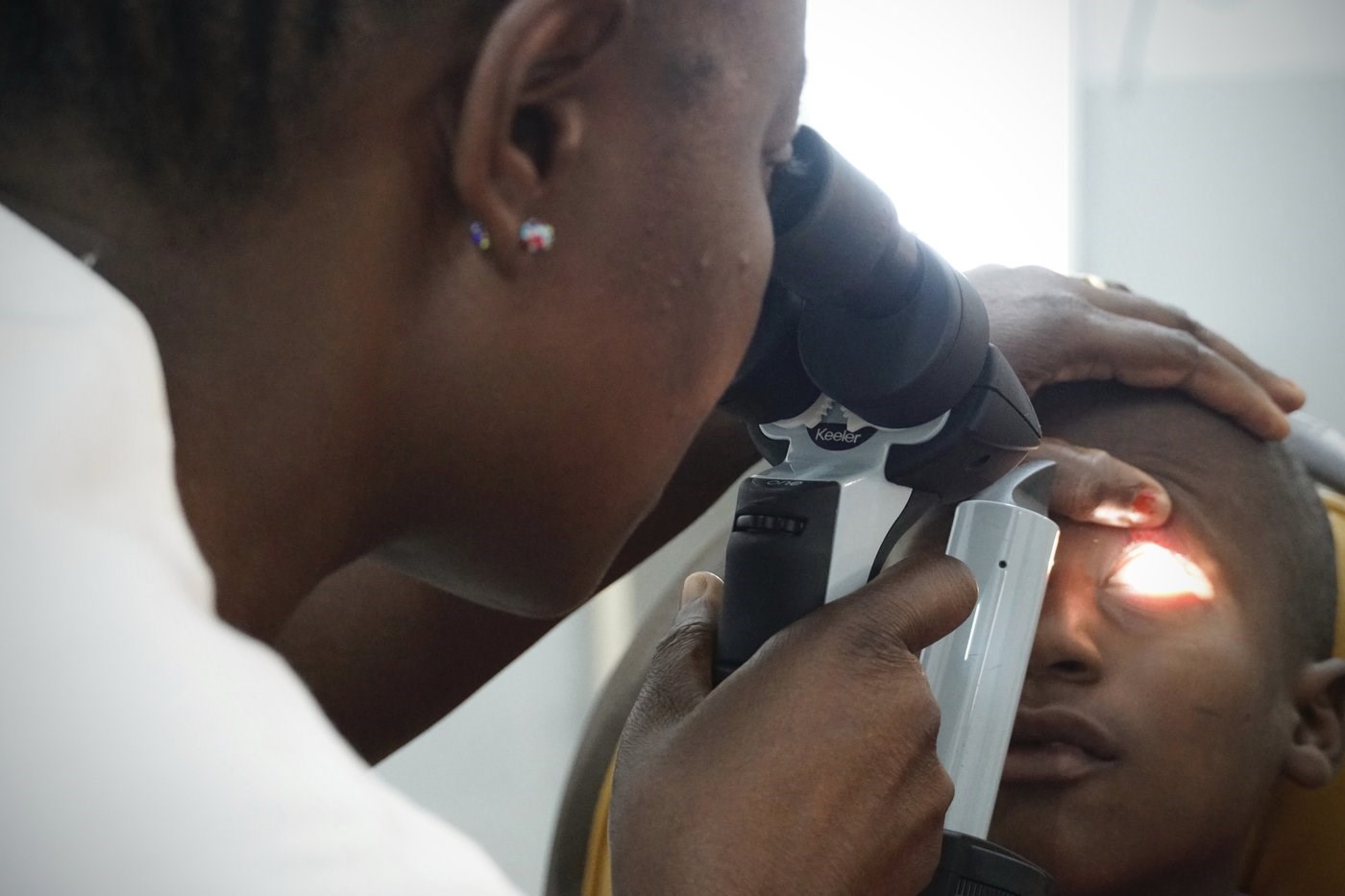
Dr. Claudette Yaméogo, Burkina Faso's only ophthalmologist specializing in treating children, checks Isaka Diallo who has lost vision in his left eye at the Sanou Sourou University Hospital in the city of Bobo-Dioulasso, Burkina Faso, Thursday, June 5, 2025. (AP Photo/Elia Borras)
July 09, 2025 - 10:17 PM
BOBO-DIOULASSO, Burkina Faso (AP) — Isaka Diallo was playing with friends when a stone struck his left eye. For two weeks, his parents searched hospitals in western Burkina Faso for an eye doctor. The village clinic only prescribed painkillers. Other health workers did not know what to do.
When they eventually found Dr. Claudette Yaméogo, Burkina Faso’s only pediatric ophthalmologist, the injury had become too difficult to treat.
“The trauma has become severe,” Yaméogo said of Diallo’s condition as she attended to him recently at the Sanou Sourou University Hospital in the city of Bobo-Dioulasso. “Cases like (Diallo’s) must be treated within the first six hours, but I’m seeing him two weeks later, and it’s already too late.”
It is a common problem in the country of about 23 million people, which has just 70 ophthalmologists.
Yaméogo , who started her practice late last year, said the work is daunting and often requires her to visit — at no cost — families who cannot afford care or cannot make their way to the hospital where she works.
While there is limited data available on eye defects in children in Burkina Faso or in Africa at large, an estimated 450 million children globally have a sight problem that needs treatment, according to the International Agency for the Prevention of Blindness.
Late intervention can significantly alter a child’s future, the organization said, with many such cases in less developed countries.
In Burkina Faso, an estimated 70% of the population lives in rural areas. And yet ophthalmologists are concentrated in the capital, Ouagadougou, and other main cities, making them unreachable for many.
While more than 2,000 ophthalmology procedures were performed in Burkina Faso’s western Hauts-Bassins region in 2024, only 52 of those were carried out in its more rural areas, according to the Ministry of Health. Most procedures were done in the area of Bobo-Dioulasso, Burkina Faso’s second city.
Not many people are aware of Yaméogo’s work. Even when they are, traveling to reach her often requires days of planning and financial saving.
In a further challenge to accessing care, Diallo’s family is among the 2 million people displaced by violence as extremist groups seize parts of the country.
To visit Yaméogo’s hospital from the village where they are sheltering, they had to travel about 40 kilometers (21 miles) on a motorcycle to Bobo-Dioulasso, spending 7,500 francs ($13) on transport, a high price for a small-scale farming family.
At least 70% of the trauma cases in children treated at the hospital come from rural areas where the risk of exposure — from conflict or from play — is higher, Yaméogo said.
Examining and treating a child is a delicate practice that requires a lot of time, something many families can’t afford. Many must return home to earn money for the treatment.
As she treated Diallo, Yaméogo noticed that the boy associated a drawing of an apple with a pepper, making her wonder: Is it that he can’t see it, or that he doesn’t know what an apple is? The fruit doesn't grow in the region where he lives.
“There’s no fixed time for examining children,” she said. “You need a lot of patience.”
Yameogo’s work has had a "very positive impact on training future pediatricians and on the quality of ophthalmology services,” said Jean Diallo, president of the Burkinabè Society of Ophthalmology.
“A child’s eye is not the same as that of an adult, which is why we need specialists to treat problems early so the child can develop properly,” Diallo said.
He cited retinoblastoma, a retinal cancer mostly affecting young children, and congenital cataracts, eye diseases that can be cured if diagnosed early. Pediatricians won’t necessarily detect them.
During another consultation, Yaméogo told the family of 5-year-old Fatao Traoré that he would need cornea surgery as a result of an injury sustained while playing with a stick.
“Sometimes I feel a pinch in my heart,” Yaméogo said as she examined the boy after they arrived from their farm on the outskirts of Bobo-Dioulasso. “His iris has detached from his cornea, so he needs to be hospitalized.”
The father, looking overwhelmed, sighed, unsure of where the money for the child's surgery would come. On paper, Burkina Faso's government covers the cost of medications and care for children under 5, but often no drugs are available in hospitals, meaning families must buy them elsewhere.
A surgery like the one for Traoré can cost 100,000 CFA ($179), several months' income for the family.
___
For more on Africa and development: https://apnews.com/hub/africa-pulse
The Associated Press receives financial support for global health and development coverage in Africa from the Gates Foundation. The AP is solely responsible for all content. Find AP’s standards for working with philanthropies, a list of supporters and funded coverage areas at AP.org.
News from © The Associated Press, 2025